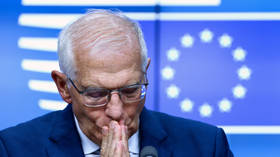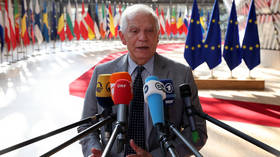EU facing winter energy crisis – Borrell

The EU may run out of gas during the upcoming winter season amid supply shortages, the bloc’s senior diplomat Josep Borrell has warned.
“Europe is facing a perfect storm: energy prices are up, economic growth is down and winter is coming,” the EU’s high representative for foreign affairs and security policy wrote, in a blog published Monday on the website of the Diplomatic Service of the EU.
There is “real uncertainty” over whether the EU will have enough gas and whether it will be able to afford it, Borrell said in the piece, titled “Europe’s energy balancing act,” describing the upcoming winter as “exceptional.”
His comments come amid a reduced flow of natural gas from Russia, a major supplier to the bloc. Borrell warned that countries of the continent must prepare for a possible total cut-off by Moscow, and suggested that Europe has struggled to replace Russian supplies.
“The hard truth is that for this winter, we are approaching the limits of what extra gas we can buy from non-Russian sources. So, the bulk will have to come from energy savings, i.e. demand reduction.” he wrote.
Last month the EU approved a plan that would see member states voluntarily reduce their gas consumption by 15%, to enable the bloc to accumulate the fuel ahead of winter. In case of an emergency, the voluntary reduction may become mandatory.
According to Borrell, the bloc has managed to reduce the share of Russian gas in its imports from 40% at the beginning of the year to around 20% today, by buying more LNG and receiving gas via pipelines from Norway, Algeria and Azerbaijan.
Russia has repeatedly said it remains a reliable supplier and honors its contractual obligations, but that international sanctions are preventing pipeline operator Gazprom from delivering gas to the EU at full capacity.
For more stories on economy & finance visit RT's business section













